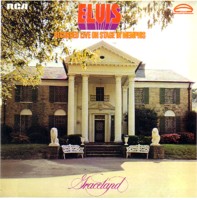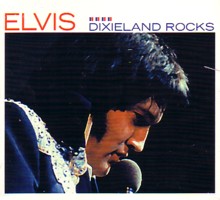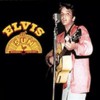'Kid Galahad'
FTD Soundtrack CD review
|
The
eleventh FTD extended movie soundtrack release, this time
focusing on the six-track E.P & alternate takes, plus
a colour booklet full of photos and information.
Many
Elvis fans would have previously purchased these soundtracks
on vinyl and again via RCA's "Double-Feature" series.
Here we continue EIN's in-depth look at each one to see
if they are worth buying again. |
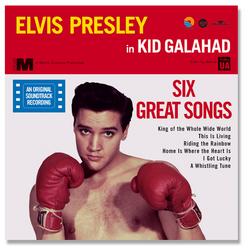 |
'Kid
Galahad' - (October 26-27 1961. 27 tracks, 76 mins)
Elvis'
10th movie was still being filmed as 'Blue Hawaii' opened
to packed theatres across the States. This would be Elvis'
last film made before the "travelogue formula" became the
routine. Even then, Kid Galahad, a remake of the Edward G.
Robinson 1937 film, still had the feeling of a meaningful
drama with six songs randomly dropped into the plot. The seriousness
of the film however was shown by the fact that former world-champion
boxer, Mushy Callahan, was brought in to help coach Elvis.
Despite this, the lacklustre script, Elvis' worry about his
increased weight and his mutual dislike of co-star Charles
Bronson stopped the film from being particularly memorable.
Musically
in 1961 Elvis was still focussed on producing quality Studio
material and a Studio B session just one week before had resulted
in 5 classic songs, including his last US # 1 for seven years
'Good Luck Charm/Anything that's Part of You'. Even with movie
material Elvis was willing to try hard and 'King of The Whole
Wide World' took 35 takes, over two days, before Elvis was
really satisfied!
Luckily
the songs were a real improvement from Elvis' last film and,
although recorded at Hollywood's Radio Recorders Studios,
the quality of the recordings was also excellent. For some
reason after 1961 (even with fabulous engineer Thorne Nogar
in control for 'Girls, Girls, Girls') the audio quality from
Radio Recorders was just woeful. While Elvis still used his
Nashville A-team band, this time Tiny Timbrell took the place
of the hospitalised Hank Garland and Dudley Brooks also injected
some cool & jazzy piano work to the session.
Filming
was on location in Idyllwild, California, where a snowstorm
in November interrupted the shoot after just 2 weeks. Filming
was completed in Hollywood in late December.
It
is worth noting just how much Elvis achieved in 1961. Four
films were completed; Wild In The Country, Blue Hawaii, Follow
That Dream and Kid Galahad. As well as the movie soundtrack
material, Elvis recorded the 'Something For Everybody' LP
along with 3 classic Number One singles. In concert Elvis
performed the Pearl Harbour Benefit concert in Hawaii, plus
the Ellis Auditorium, Memphis Charity show. It was an extraordinary
year.
The
FTD sleeve and booklet contains the usual mix of photos & memorabilia. Look closely and you can see a slight red blotch
that Elvis has above his right eye in all the studio publicity
shots. Unfortunately there is a slight picture misprint with
this booklet, as the cover-fold image is repeated on the In
And Outtakes page.
The
'Kid Galahad' E.P only made number 30 in the US charts. In
the UK, released one month after 'Return To Sender' was #
1, it got to # 23 and became Elvis' highest charting UK Extended
Play.
The
original mono EP recordings start this CD. While the added
echo somehow spoil their sound, the mono is mixed for a loud
impact and sounds pretty exciting. The CD versions also exactly
match the original vinyl EP.
The
original stereo Masters, previously released on 'Double Features',
are also featured and have a very different (in some ways
disappointing) audio mix from the original Studio tapes. They
were mixed for a very flat 'mono' sound but are definitely
worth having, since they are the full-length recordings which
were edited down to fit onto the six track EP.
Once
again the real joy is hearing the outtakes as they were recorded
onto 3-track tape. The pure audio quality of the studio takes,
without additional echo, is fantastic and you can feel the
excitement of the band as they worked together for the last
time in 1961. Unlike the previous soundtrack for 'Follow That
Dream' there is plenty of studio interaction and a great deal
of development in the songs themselves. Several of them go
from poppy soundtrack-type versions, to Jazz-pop interpretations,
to hot-blooded rock'n'roll!
For
those who are interested, and to truly appreciate this extended
CD, here is a much, much closer look at the outtakes!
'King
Of The Whole Wide World' - Elvis started his October 26th
session with this song and after 31 takes, and several major
musical variations, still wasn't satisfied! There were five
major reworkings just on the first day!
Session
One
Takes
1+ 2 - These earlier takes have a poppier, less rocking feel
than the later ones. Sounding very like a rehearsal, the first
take is actually complete. At the end Elvis laughs, "You guys
don't get paid any more if we go overtime so let's hurry!" Take 2 is already in a faster tempo & with a different arrangement
but soon falls apart. Elvis asks for the soundtrack musical
director, Charlie O'Curran, to help out. Note that these takes
were also featured on the 'Today, Tomorrow & Forever' box-set
but there they were (understandably) edited down for the general
public, and presented in their reverse order. They were also
noted down as "Alt Take 3" which was incorrect.
|
Takes
7+ 8 - By now the Jordanaires' intro vocals have been
removed, which is questioned by engineer Thorne Nogar.
Elvis answers, "Yeah, we took the group out. In fact
they were out before they got to the studio!"
The
tempo has been increased and the guitar licks are prominent,
while Elvis' vocal still remains surprisingly laid-back.
Boots Randolph's sax is rough & ready.
Take
13 - With a much punchier Boots Randolph sax intro,
Dudley Brooks also adds some cool jazz figures on the
piano. Previously unreleased (even on bootleg) and with
a very different feel to all other versions this is
a real gem. Dual drummers D.J Fontana & Buddy Harman
drive a pounding beat to the finish, with Elvis adding
a satisfied, 'Yeah" at the end. A great addition to
our collection.
|
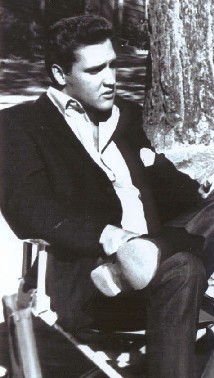 |
Take
14+15 - Beforehand Elvis comments, "Everybody play loud, to
hell with it! We've got to or we'll be here all night!" By
now the song has changed key and the arrangement is completely
altered. Boogie-woogie piano has been added and the band try
out a more basic rockin' arrangement.
Take
16 - At this point Elvis has strangely decided to go back
to the original arrangement of the very basic demo! Sounding
surprisingly like Elvis' original Sun Studios trio, and with
very simple back-up vocals, this is very different again.
This time Elvis forgets the melody stopping the band with, "God almighty, damn! Hold it, let's take it again real quick,
I forgot the tune!"
Take
20-25 & 31 - By now the song has taken on a very similar feel
to Elvis' early takes of G.I Blues' 'Shoppin' Around'. With
all the changes these takes again feel like a rehearsal! By
now hard-working Boots Randolph has lost his impetus and so
has Elvis' vocal. The final attempt of the first night, Take
31 has the added vocal bass-line of Jordanaire Ray Walker
but everyone sounds far too worn out. Sensibly, the band call
it quits!
Session
Two
Take
1-3 - Coming back to the song at the end of the second day
of recording, the tempo has at last been increased to match
the optimism of the lyrics. This is the raw rock'n'roll sound
of the Master.
Take
1 falls apart after 30 seconds with Elvis commenting, "What
the hell happened?" All the second day's takes have the sound
of Elvis snapping his fingers in appreciation, as does the
Master version.
Take
3 has previously been featured on the FTD 'Out In Hollywood'
but had the almost mono 'stereo master mix'. Here, with the
fabulous stereo 3-track studio mix it sounds exceptional.
With Elvis' fabulous vocal, great boogie piano, cool rhythm
guitar, along with Boots Randolph blowing his sax to save
his soul, this version is outstanding. The final stereo Master,
that actually follows on this CD, sounds very compressed and
a dull in comparison.
|
'Home
Is Where The Heart Is' -
Takes 1&2, both false starts,
have some very humorous moments with D.J Fontana missing
the beat. Take 3 also ends up with Elvis giggling, as
he too misses the start saying, "Man, I don't know where
the hell to come in!"
Take
6, which breaks down halfway, has a delightfully gentle
vocal from Elvis as he feels his way and then heads
off on a different melody. "Hold It" he says, "I forgot
the damn tune of this son-of-a-bitch!" The first complete
take 7 follows, but still has a very slow tempo compared
to the Master. This is another gem as the lower key,
slow backing vocals, along with added reverb guitar,
create a fascinating version that Elvis wants to hear
played back.
|
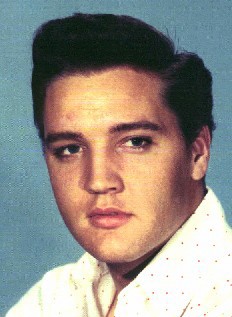 |
Take
10 starts with Elvis yawning "Ok". The slow tempo and low
key provide a delicious vocal and the 3-track mix gives it
a brilliant open feel. Try listening to right channel only
for a fascinating a-cappella version!
Take
13 + 14 - Elvis starts by admonishing Freddie Bienstock who
was the manager of Elvis' song publishing company. While the
quality of Elvis' songs in 1961 was pretty good, it was this
terrible deal that kept making Mr. Bienstock a nice pile of
money while he provided Elvis with worse & worse quality material.
Elvis rightly says, "Where's Freddie the free-loader?"
These
takes have been previously released and you can see why Ernst
chose them for 'Silver Screen Stereo.' The tempo is slightly
faster here and Elvis' vocal and The Jordanaires now match
each other perfectly. The arrangement is very different from
the final Master, with some light guitar picking instead of
the strumming that was used on the actual single. With the
slower tempo, lack of added echo and pure audio quality this
is totally exquisite - and essential for your collection.
'Riding
The Rainbow' - Take 1 has also previously been released
on 'S.S.S' but here it is complete with more studio chat,
as well as the full ending rather than a fade-out. At a much
slower tempo than the Master, and with some exemplary jazz
piano from Dudley Brooks, this has a very different feel indeed.
Still sounding like a rehearsal (you can even hear the Jordanaires
discussing the song as they are singing) there is a spontaneous
jazz-club vibe to this which makes it an all-time favourite
version.
By
Take 7 they have increased the tempo making it more like a
Twist. The arrangement is also changed, with more guitar and
boogie-woogie piano added to the chorus giving it a more rockin'
feel. The end of the song, with a D.J spontaneous drum-roll,
is a treat. The tempo was even faster on the Master.
'I
Got Lucky' - First version Take 1 has a rehearsal feel,
with Elvis even giving a slight laugh while singing the lyrics,
at 1.10. With a lighter arrangement these early versions also
have one less verse, making it a shorter song. Note that it
was this version that was on 'Silver Screen Stereo' not Take
6 as indicated on the booklet. The Alternate Master (Tk.6) again has a smoother arrangement than the final release and
Elvis' vocal still sounds a little unsure. It is also interesting
to compare the Stereo Master with the final mono version since,
in this instance, the mono mix actually makes the song sound
punchier & more rock'n'roll. (Elvis is always said to have
liked mono mixes and this helps explain why)
|
'This
Is Living'
- Take 2 - A very lightweight song anyway,
this version has no saxophone backing and a very simple
guitar arrangement. The song mainly features The Jordanaires,
who sound very unsure in this early take, and Elvis
only comes in halfway through.
The
3-track recording spatially opens up the song and this
version delightfully captures the band in action. At
the end everyone laughs with D.J. adding, "What happened
there!" While the Master definitely benefited from the
added echo, this time making it sound more dynamic,
this rehearsal will grow on you.
|
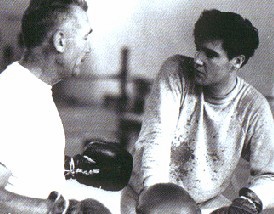 |
'A
Whistling Tune' - At a much slower & more suitable tempo
than from the 'Follow That Dream' session, Elvis lets his
voice slide deliciously over the melody. Take 2 is a lighter
arrangement and, although this was never going to be the Master,
the clarity of the recording is fabulous. The band is recorded
so well, & with the percussion so clear, you wonder how Radio
Recorders managed to make such lousy quality recordings from
1962 onwards! You can hear Elvis' chair creak and even the
rustle of his lyric sheet. Another beautiful & worthy addition.
The stereo Master, again with extra echo, is interesting for
having almost a minute edited from it for the final release.
Verdict
- With only 6 songs featured, this soundtrack could be
a little repetitive. However, unlike 'Follow That Dream',
there is plenty of musical development on each track and it
is fascinating to witness the recordings as they progress.
Indeed, some songs sound so different on earlier versions,
that they could have also been released in their own right.
The audio quality of the 3-track stereo transfer also shines
a new light onto these great performances. If you haven't
heard any of these alternate takes before, then the best ones
will truly astonish you. Another essential soundtrack.
Tracklist
1: King Of The Whole Wide World (original EP mono master)
2: This Is Living (original EP mono master)
3: Riding The Rainbow (original EP mono master)
4: Home Is Where The Heart (original EP mono master)
5: I Got Lucky (original EP mono master)
6: A Whistling Tune (original EP mono master)
New Bonus Tracks
7: King Of The Whole Wide World [M1-version] (1, 2)
8: Home Is Where The Heart Is (13, 14)
9: Riding The Rainbow [M4-version] (1)
10: I Got Lucky [M5-version] (6 )
11: King Of The Whole Wide World [M1-version] (7, 8)
12: This Is Living (2)
13: Home Is Where The Heart Is (1, 2, 3, 6, 7)
14: King Of The Whole Wide World [M1-version] (13)
15: A Whistling Tune (2)
16: King Of The Whole Wide World [M1-version] (14, 15, 16, 17, 20, 21, 25)
17: I Got Lucky [M5-version] (1)
18: Home Is Where The Heart Is (10)
19: King Of The Whole Wide World [M1-version] (31)
20: Riding The Rainbow [M4-version] (7)
21: King Of The Whole Wide World [M7-version] (1, 2, 3)
22: King Of The Whole Wide World - (Full Length Stereo Master)
23: This Is Living - (Full Length Stereo Master)
24: Riding The Rainbow - (Full Length Stereo Master)
25: Home Is Where The Heart Is - (Full Length Stereo Master)
26: I Got Lucky - (Full Length Stereo Master)
27: A Whistling Tune - (Full Length Stereo Master) |
If you have ever enjoyed the happiness & fun of Elvis' movies then FTD's Special Edition Soundtrack series are well-worth exploring. EIN suggests you buy the essential 'Viva Las Vegas' and then continue with your favourite selection of Elvis' movies.
Check out all of our previous Soundtrack reviews
Loving You
Viva Las Vegas
Fun In Acapulco
Girl Happy
Harum Scarum
Spinout
Paradise, Hawaiian Style
Double Trouble
Frankie & Johnny
It Happened At The World’s Fair
Follow That Dream
Tickle Me
Click here for 'Silver Screen Stereo' CD review
Click here for FTD deluxe Something For Everybody review
Click
to comment on this review
|
|

